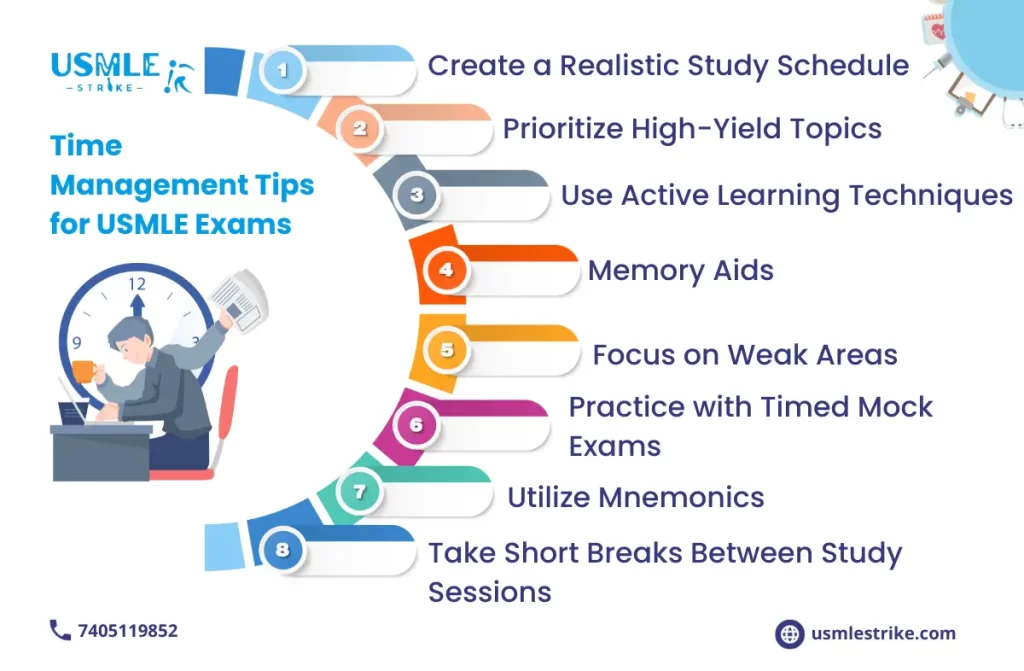Embarking on the journey to become a licensed medical professional is both exhilarating and challenging. One of the critical milestones on this path is successfully navigating the United States Medical Licensing Examination (USMLE). Time management tips for USMLE are paramount to conquer the three steps of the USMLE – Step 1, Step 2, and Step 3. In this blog post, we’ll explore invaluable time management strategies tailored to each step, ensuring you approach your exams with confidence and efficiency.
Step 1 Time Management Tips for USMLE
Mastering time management for USMLE Step 1 is crucial as it sets the foundation for subsequent steps.
Crafting Your Strategy
Prior to your exams, it’s crucial to devise a personalized plan for managing your time effectively. Tailor this plan to your strengths and weaknesses, ensuring that it accommodates your individual pace and comfort levels with different types of questions. Take advantage of resources like USMLE Strike to help refine this strategy.
Maintaining a Balanced Pace
Avoid the temptation to rush through questions or linger excessively on any one. Certain subjects, such as biostatistics, genetics, and ethics, may require more time. Instead, maintain a steady tempo, moving forward if you encounter difficulty. Flag challenging questions for later review when time allows.
Stay Focused on the Task
Distractions can disrupt your concentration and hinder your performance. Minimize these by silencing electronic devices, refraining from engaging in conversations with fellow test-takers, and keeping your attention squarely on the exam at hand.
Strategic Breaks
Make the most of scheduled breaks to recharge both mentally and physically. Avoid discussing exam content with others during these breaks, as it can heighten anxiety and detract from your focus on the task ahead.

Step 2 Time Management Tips for USMLE
Moving on to USMLE Step 2, time management becomes even more critical as clinical knowledge.
Clinical Exposure Integration
- Integrate clinical exposure with your study routine to reinforce theoretical knowledge.
- Allocate time for case simulations and patient interactions to enhance clinical reasoning.
Review Core Clinical Rotations
- Focus on core clinical rotations to build a strong foundation.
- Customize your study plan to align with the subjects covered in Step 2, such as internal medicine, surgery, pediatrics, and psychiatry.
Practice Time-Efficiently
- Optimize your time by practicing with timed questions and simulations.
- Develop a strategy for managing time during the exam to ensure you complete all sections.
Mock Exams and Assessments
- Take full-length mock exams to simulate test day conditions.
- Analyze your performance and adjust your study plan based on the areas that need improvement.
USMLE Step 3 Time Management
As you approach the final step of the USMLE, effective time management tips for USMLE becomes a culmination of your journey. Here are strategies specific to Step 3:
Balancing Multitasking
- Step 3 assesses your ability to manage multiple tasks simultaneously.
- Practice juggling between different question formats, including multiple-choice, multiple-select, and case simulations.
Time Allocation for CCS Cases
- Understand the Computer-Based Case Simulations (CCS) format and allocate sufficient time for each case.
- Develop a systematic approach to address patient management scenarios efficiently.
Incorporate Step 3 Material into Step 1 and 2 Review
- Integrate Step 3-specific material into your Step 1 and Step 2 reviews.
- This ensures a comprehensive understanding and reduces the need for intensive last-minute preparation.
Adaptive Learning Strategies
- Identify weak areas and focus on adaptive learning strategies.
- Tailor your study plan based on your performance in practice exams to maximize efficiency.
Conclusion
Successfully navigating the USMLE requires more than just mastering content; it’s about managing your time effectively throughout the preparation process. By implementing these Time management tips for USMLE tailored to each step, you can approach the exams with confidence and increase your chances of success. Remember, it’s not only about studying harder but also about studying smarter.





